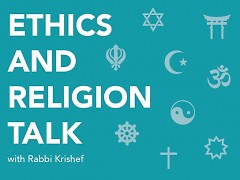The Reverend Colleen Squires, minister at All Souls Community Church of West Michigan, a Unitarian Universalist Congregation, responds:
“Most Unitarian Universalists do not believe in the concept of sin. The Universalist part of our name means universal salvation, and atonement and blood sacrifices are truly foreign concepts to our beliefs. I would imagine these ideas may be challenging to some readers to understand.
“We are, however, justice-seeking people. It is important to be in right relationship with others, to seek forgiveness when we have acted wrongly, and to work towards full reconciliation not so that we receive entrance into heaven but because it is truly the right thing to do.”
Rev. Ray Lanning, a retired minister of the Reformed Presbyterian Church of North America, responds:
“The short Presbyterian answer is, there is no way to fully atone for sin. Human nature is so corrupted by sin and so bent toward evil that efforts to atone for sin must fall short of the mark. Such efforts are sinful in themselves, if they do not conform to the requirements of God’s Word.
“If you only want to patch up a quarrel or compensate for a wrong you have done, that’s the least part of your problem. Ultimately, all sin is sin against the infinite holiness and majesty of our Creator: ‘Against thee, thee only, have I sinned, and done this evil in thy sight’ (Psalm 51:4). King David knew he had sinned against many others, but God was first on the list. As David also knew, ‘It is not possible that the blood of bulls and goats should take away sins’ (Hebrews 10:4; see Psalm 51:16).
“If we could find our own way to atone for sin, there would be no need of the Bible, and Christ need not have come into the world. The sacrifice of Christ on the cross is the only full atonement for our sins. Our part is to trust in Christ and the infinite value of His death for sinners. ‘Being justified by faith, we have peace with God through our Lord Jesus Christ … by whom we have now received the atonement’ (Romans 5:1, 11).”
Fred Stella, the Pracharak (Outreach Minister) for the West Michigan Hindu Temple, responds:
“In Hindu Dharma there is no need to shed blood for atonement. There are many ancient rituals that are performed in an attempt to cleanse one’s conscience. A fire ceremony where devotees cast seeds, butter and rice into the flames, symbolizing the roasting of the seeds of karma (past sinful actions) is often done. As with other religions, water is used as well. This could be anything from a sprinkling to a dip in a river.
“Once there were devotees debating the practice of sacred bathing. They asked their guru if dunking in a river really did remove sin. The guru replied that, yes, when one enters a sacred river all sins are gone; at least until you meet them again, as they are simply waiting for you with your clothes on the banks.
“So it’s important to understand that while these rites can be important if they cause us to introspect and take a physical action, the only ways to truly atone is for us to attempt to correct past bad behavior, right any wrongs we may have done to others, and change our consciousness from the inside by prayer, meditation, selfless service and devotion.”
Father Kevin Niehoff, O.P., a Dominican priest who serves as Adjutant Judicial Vicar, Diocese of Grand Rapids, responds:
“The Roman Catholic Church has the sacrament of reconciliation, often referred to as confession. Atonement for sins includes the confession of those sins to a priest, who gives a ‘penance,’ hears the individual’s sincere contrition, and then gives absolution. One must remember that the sacrament of reconciliation is a way of praying to God… it’s not simply an individual act of telling someone his/her sins. Conversely, it is not simply the priest alone giving absolution for the priest does so through the ministry of the Church and invoking Father, Son and Holy Spirit. I suggest a further step is that once the individual has received God’s mercy then it is time for that person to forgive himself/herself. This last extremely important step is often omitted.
“For Catholics, blood sacrifice is today a sign of the atonement of sins. The greatest blood sacrifice is that of Jesus Christ who lived, suffered, died on the cross, and rose again. When Catholics celebrate what is refer to as the ‘holy sacrifice of the mass,’ we join again in the life of Jesus Christ who suffered for all humankind when his life was sacrificed on the cross.”
My response:
The Hebrew Bible does not require a blood sacrifice for atonement. It does require taking responsibility for the sin, making restitution, and resolving not to do it again.
This column answers questions of Ethics and Religion by submitting them to a multi-faith panel of spiritual leaders in the Grand Rapids area. We’d love to hear about the ordinary ethical questions that come up on the course of your day as well as any questions of religion that you’ve wondered about. Tell us how you resolved an ethical dilemma and see how members of the Ethics and Religion Talk panel would have handled the same situation. Please send your questions to [email protected].
The Rapidian, a program of the 501(c)3 nonprofit Community Media Center, relies on the community’s support to help cover the cost of training reporters and publishing content.
We need your help.
If each of our readers and content creators who values this community platform help support its creation and maintenance, The Rapidian can continue to educate and facilitate a conversation around issues for years to come.
Please support The Rapidian and make a contribution today.
